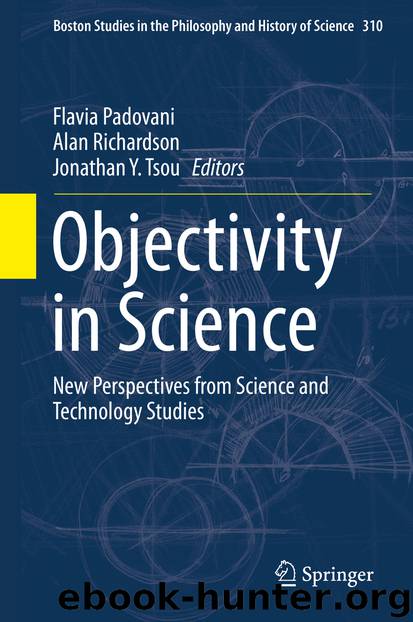Objectivity in Science by Flavia Padovani Alan Richardson & Jonathan Y. Tsou

Author:Flavia Padovani, Alan Richardson & Jonathan Y. Tsou
Language: eng
Format: epub
Publisher: Springer International Publishing, Cham
Thus, Liebmann wants to conclude, none of our representations are determined by or resemble a world that exists beyond them.
In fact, this argument provides only partial support for Liebmann’s idealism. As Helmholtz and Lange understand, Müller’s doctrine on its own does not entail that our representations of spatial and causal structure do not resemble real spatial and causal structure of mind-independent objects. That is why they both develop further arguments modelled on Müller’s for their denials that our representation of spatial structure resembles the real spatial structure of external objects. Liebmann’s argument, as he states it, neglects the possibility that our representations of external stimuli exciting nerves and sending signals to the brain might resemble the real spatial or causal structure of that process, even if the pinkish-grey hue of our image of the brain does not correspond to anything beyond our representations. Thus despite Liebmann’s apparent suggestion that his idealism is nothing but the epistemological consequences of Müller’s doctrine worked out consistently, that cannot ultimately be all there is to his argument.
Indeed, it is not all there is to his argument. Liebmann does deny that our representations of spatial and causal structure resemble any real spatial or causal structures in the mind-independent world, but his reasons for these denials are fundamentally different than Helmholtz’s and Lange’s. In particular, Liebmann’s reasons do not depend on positing physiological or empirical-psychological processes that determine our representations of spatial and causal structure. For Liebmann, our representations of space, time, and causality are Kantian “forms of knowledge”, and he argues that they are ordering relations that the mind (he typically says “spirit”, “intellect”, or “understanding”) uses to interpret sensations (Liebmann 1869, 108). He argues further that, as ordering relations the mind uses to interpret sensations, they cannot themselves be derived from sensations (Liebmann 1869, 109). (He thus maintains that our spatial representations are innate in a way that both Helmholtz and Lange are at pains to deny in the 1860s.) For Liebmann, these forms of knowledge are rules of the mind without which we could have no empirical knowledge at all.
Liebmann’s conception of these forms of knowledge as rules without which no empirical knowledge would be possible has two important consequences. First, the forms of knowledge are unexplained explainers. While (as we will see below), they explain the possibility of objective representation for Liebmann, he insists that they admit of no explanation themselves. Rather, they are “the final, ultimate explanatory ground” of objective representation (Liebmann 1869, 108). It would be consistent with this view to argue against Helmholtz and Lange that physiology of the sense organs cannot provide any explanation of these forms of knowledge, since as an empirical science, physiology presupposes and depends on just those forms. Liebmann thus maintains that philosophers cannot investigate or explain these forms empirically.
Second, Liebmann thinks that his conception of our representations of space, time, and causality entails that we cannot claim that they resemble any features of a mind-independent world. Since, on his account, these forms of
Download
This site does not store any files on its server. We only index and link to content provided by other sites. Please contact the content providers to delete copyright contents if any and email us, we'll remove relevant links or contents immediately.
| Anthropology | Archaeology |
| Philosophy | Politics & Government |
| Social Sciences | Sociology |
| Women's Studies |
The remains of the day by Kazuo Ishiguro(8968)
Tools of Titans by Timothy Ferriss(8363)
Giovanni's Room by James Baldwin(7320)
The Black Swan by Nassim Nicholas Taleb(7104)
Inner Engineering: A Yogi's Guide to Joy by Sadhguru(6785)
The Way of Zen by Alan W. Watts(6596)
Asking the Right Questions: A Guide to Critical Thinking by M. Neil Browne & Stuart M. Keeley(5755)
The Power of Now: A Guide to Spiritual Enlightenment by Eckhart Tolle(5745)
The Six Wives Of Henry VIII (WOMEN IN HISTORY) by Fraser Antonia(5496)
Astrophysics for People in a Hurry by Neil DeGrasse Tyson(5176)
Housekeeping by Marilynne Robinson(4434)
12 Rules for Life by Jordan B. Peterson(4299)
Double Down (Diary of a Wimpy Kid Book 11) by Jeff Kinney(4257)
The Ethical Slut by Janet W. Hardy(4241)
Ikigai by Héctor García & Francesc Miralles(4238)
Skin in the Game by Nassim Nicholas Taleb(4235)
The Art of Happiness by The Dalai Lama(4122)
Skin in the Game: Hidden Asymmetries in Daily Life by Nassim Nicholas Taleb(3987)
Walking by Henry David Thoreau(3950)
